#male greek descent
Explore tagged Tumblr posts
Note
Hello! Do you (and other Greeks) find "Hellenic polytheism" an acceptable term for the religion worshipping the ancient Greek gods? If not, what would you want people to call it instead? I feel strongly that I would not be able to change my belief itself, but I definitely want to be respectful in what I call it and my other actions
Hellenic Polytheism should be fine. You can introduce yourself as a Hellenic Polytheist.
People have a bit of a hard time with this hell of terms (get it? he he), so I am gonna create a mini-lexicon. It's not targeted to you in specific to use all these, it's just for whoever is interested to clear this up in their minds.
A very hellenic lexicon
Hellás = 1) the official term for Greece and the only one ever used by Greeks themselves (there is no equivalent of "Greece" in Greek), 2) a historical ancient region in central mainland Greece where southeast Epirus and southwestern Thessaly meet and where a lot of Achilles' soldiers supposedly originated from, 3) the administrative region of central mainland Greece during the Byzantine Empire
Hellenic = anything Greek (like you may say "this is an american movie", that's why you can use hellenic polytheism, because it means "greek religion of many gods"). And by anything Greek, we mean ANYTHING. Care to know what the "Greek Orthodox Church" is called in Greek?

You guessed it! Hellenic Orthodox Church...! So you see, how when foreigners say some things like "i'm hellenic, hellene, hellenist" like "what hellenic are you? coffee? bank? Christian?" You know?
Hellen = the mythological progenitor of the Greeks according to Hesiod. Not to be confused with Helen.
Héllene = a Greek by descent, nationality and / or ethnicity. And if we are being totally accurate, it's a Greek male. I don't actually know how it is pronounced in English but ideally keep the last e silent. (By the way we do not pronounce that h in the beginning in all these words for the last 1500 years or so.... just saying.)
Héllenes = the Greeks, just men or mixed. The last e is NOT silent.
English does not have gendered nouns but Greek does so technically there is a seperate word for Greek women but I don't know if this is transferable to English. If we could do it in theory and by following the trasliteration style of the Hellene, it should be something like:
*Hellenís / Hellenidae or Hellenides = Greek woman / women*

Hopefully this explains why random foreigners identifying as "Hellenes" is exremely problematic.
Helladic = pertaining to the geography and territory of Hellas and whatever happens strictly within its borders
Hellenisation = spread of Greek influence and culture, it is also used for cases of Greek assimilation in ancient times
Hellenistic = 1) something being characterized by particular Greek influence, 2) referring to the era after the Classical period and before the Roman period
Hellenicá = 1) the Greek language, 2) (infrequent) Greek matters, documented topics about the Greeks
Hellenism = The complete Greek culture, civilization and nationhood, the essence of being Greek.
Hellenist = 1) a specialist in the study of Greek language, literature, culture, or history, or an admirer of the Greek culture and civilization, 2) a person who adopted the Greek customs, language and culture during the Hellenistic period, 3) now, the English Wiktionary also adds the "a follower and practitioner of Hellenic religion" <- which one of the two??? XD, clearly following the trend of western classicist circles. In the Greek Wiktionary for the same exact term (Ελληνιστής) that last interpretation does not exist and I can guarantee you it is officially rejected. Here's why: the suffixes -ist and -ism (as well as all suffixes here) are suffixes of Greek origin and they signify that someone is something or is passionate and dedicated to something on the superlative or very very earnestly, essentially. So when someone says they are a hellenist, they are supposed to be dedicated or charmed by anything that makes something hellenic, not to be professional cherry pickers. Of course, everyone is allowed their preferences, however you can't be interested in a super specific / niche thing like a religion mostly practiced 2000-3500 years ago and simultaneously show complete disregard and ignorance on literally everything else about this civilization, history and its living people and call yourself a hellenist. It tears the word apart. By the way this is not targeted at you. You are here asking about it, wanting to do the right thing. I am referring to this thing happening in this forum that @alatismeni-theitsa 's Anon was complaining about; they obsess over the ancient religion and they hate everything Greek post the AD mark. That's not being a Hellenist. That's not a Hellenism forum. That's the exact opposite in fact. Very few people can correctly claim the term "hellenist".
BONUS: Philhellene is kind of synonym to "hellenist" and it means "friend / lover of the Hellenes and all things hellenic". But again it can surely be misused. Not all self-proclaimed Philhellenes were ones indeed. Some, like Lord Byron, were Philhellenes through and through, on the other hand.
Of course, one definitely does not have to go through what Lord Byron and other great Philhellenes of the 19th century went through to prove they are a Hellenist or a Philhellene! My point is that very very few people can correctly claim the identity of a Philhellene or a Hellenist.
Therefore, "Hellenic polytheist" is just fine.
#greece#greek language#languages#linguistics#greek#greek culture#greek facts#anon#ask#hellas#hellenic
78 notes
·
View notes
Text
Straightwashing The Picture of Dorian Gray?
Two days ago, the Internet discovered a prospective Netflix adaption, that of The Picture of Dorian Gray into a tv show The Grays. (Deadline)
As the title entails, Katie Rose Rogers (writer) has made the choice to give the protagonist of Wilde’s novel a brother. She allegedly decided not to add a new Gray but to turn a pre-existing character into a relative of the oh-so-famous Dorian Gray: Basil Hallward.
The painter of the cursed portrait that contains and manifests all of Dorian’s flaws and villainy, the adoring artist infatuated with his muse and his beauty, one of the characters often analysed in queer studies of the novel, will be turned into Dorian’s brother.
Narrative license is a common occurence in the art of adaptation, but the writer’s choice raises some issues on the Internet considering the original novel, its impact on its author’s life, as well as its importance in the field of research and its role in representing queerness in history.
The Picture of Dorian Gray is an 1891 work of literature written by Oscar Wilde. The novel, itself derived from an early novella-length work, tackles the moral descent of Dorian Gray as it never takes shape on his forever-young angelic face (and thus going against the belief of physiognomic degeneration of its time) but instead taints a portrait made of him by a friend—the aforementioned Basil.
Connoisseurs and those less interested in the works of Oscar Wilde tend to know at least two things about the author:
one, he wrote Dorian Gray;
two, he was a homosexual.
It is no secret that his novel is submerged by the homoerotic feelings the characters harbour towards one another. While the characters do not overtly engage in romance—a feat which would have led to a bigger scandal than it already was—they do present characteristics that are outwardly associated with queerness. Be it Lord Henry and Dorian Gray taking on a mentor/mentee approach close to Greek pederasty (educational), or Basil and Dorian adopting the artist and muse situation-ship often reserved to male artists and their female objects of inspiration and idolatry, the male/male relationships in the book deviate from normative Victorian masculine and homophile behaviours and extend into unspoken homosexual territories.
In the case of Basil, transforming him into Dorian’s brother means erasing the scandalous and ambiguous relationship between the characters that is often read as being one of the many reasons behind the decay of the portrait, by denoting the repression of nonconforming identities. Basil is written as admiring the beauty of Dorian: he considers him his own personal muse, the driving force behind his art, one that cannot be beaten and that pushes him to be a greater artist. He is as enamoured with Dorian as the Pre-Raphaelites were with women.
In the uncensored version of Dorian Gray, made publicly available in 2011, Basil says quite explicitly to Dorian Gray:
"It is quite true I have worshipped you with far more romance of feeling than a man should ever give to a friend. Somehow I have never loved a woman.” (The Guardian)
In the version commonly read by the general public, Basil also tells Lord Henry (about Dorian Gray):
“I find a strange pleasure in saying things to him that I know I shall be sorry for having said.” (Chapter 1)
This simple sentence reveals an unusual relationship constituted of deviant expressions of sentiments between Victorian men.
In the Basil/Dorian relationship, the latter is feminised through his position as Basil’s muse, he becomes an object of desire and obsession, then an enactor of violence through his ever-lasting youth and beauty, making him a relative of the femme fatale type.
Erasing the grey area between the two characters diminishes the complexity of Wilde’s work as a public critique of Victorian gender roles and morality, especially in light of his own trial and prison sentence for which the homoerotic subtext has been used as proof. This raises the issue of straightwashing and how easy it is to erase queerness in the entertainment industry to accommodate to an heteronormative vision.
——————
https://www.theguardian.com/books/2011/apr/27/dorian-gray-oscar-wilde-uncensored
https://deadline.com/2024/08/dorian-gray-series-netflix-katie-rose-rogers-rina-mimoun-greg-berlanti-1236045373/
https://www.history.com/topics/gay-rights/oscar-wilde-trial
#dorian gray#the picture of dorian gray#book adaptation#oscar wilde#netflix#this is for me to practice writing don’t break my knees#gothic#victorian#literature#queer#queer books#queer history#gothic literature#lgbtq books#queer lit#classic lit#tpodg
58 notes
·
View notes
Text

writeblr intro!
about me
Hi there, I'm Florence (or Flor for short)! I'm a tech person by day, an artist by night, and a writer everywhere in between!
I set up this blog because I want to document my writing process whilst also being able to connect to fellow writers and get into a community! Since I'm new here and don't know anyone I'll give a follow to everyone who interacts with this post! ✧
writing
culturally/ethnically diverse characters
mostly contemporary about topics such as grief, identity, mental health - even though I am working on my first post-apocalyptic project rn
I would love to write more angst which I'm practicing atm
I keep it pretty PG (even though I like reading non-PG stuff I don't feel comfortable writing it myself)
there's always a little bit of romance lingering I guess but it's never the main story
WIPs
SUNFLOWER KILL
action / slife of life idk
Hitwoman of Turkish descent living in London visits her grandmother in Turkey over the summer, whose reality is completely different to hers
mood: funny, hopeful, exciting (hopefully)
SOMEWHERE BETTER
dystopian / post-apocalyptic duology
set in 2067 on a dirty sad earth (think a mix of Fallout wastelands and the earth depicted in Idiocracy)
the plague has taken over the world causing humanity to escape to mars colonies
native American / Mediterranean (I don't touch on cultural / traditional themes though as I am not native American myself, it wouldn't be authentic and I don't want to be accidentally insensitive) female main character with hearing aid (yeahhh!)
south American male side character who used to work at the colonization corporation and is now on the run
finished
road trip novel featuring a young woman of greek descent

Good Company | Novel [available here] (release date 24.07.2024)
True-Crime fan Sofia is still mourning the loss of her grandfather when she unexpectedly comes across his legacy in the form of a forgotten movie script. One thing leads to another and Sofia soon finds herself on a turbulent road trip along the West Coast, where she not only encounters weird strangers, bizarre delicacies, and odd museums but also has to prove herself as a getaway driver. Their destination is Los Angeles, where Sofia hopes to find not only answers but also traces of her grandfather and maybe even a piece of herself …
fun facts
I have four cats! (yes, four)
I love true-crime podcasts and forensic files (who doesn't?)
I'm vegan
I'm also an artist over ✧ here ✧
#writeblr intro#writing community#writers on tumblr#writeblr#writers of tumblr#writer community#writer stuff
56 notes
·
View notes
Text
On Hera and Zeus’s marriage: a rant
I’ve seen a lot people get mad at Zeus because his application of marriage in mythology is a bit more flexible than what we’re used to, while misunderstanding the theological and cultural realities that surround it
The Native Hera and the Foreign Zeus
Long ago, before what is now known as the Greek pantheon was a thing, the Greeks worshipped the goddess now known as Hera, and she was their main goddess. Some time later, another group of people, recognisable as derived from Proto-Indo-European descent through their worship of a sky father (Zeus), either conquered or merged with the existing culture of the time.
These two groups, to avoid too violent of a clash while merging, made their patron deities spouses to make the transition more smooth for everyone, effectively breaking the Proto-Indo-European pattern of sky god-earth goddess duos, while still being present to a lesser extent in the form Demeter’s brief marriage with Zeus.
Divine marriage
Now, we all know Zeus in his myths was quite a womaniser, both because of his function as an All-Father, and as his function as the representation of Ancient Greek patriarchal society where men could have as many extramarital affairs and women could not. Note the fact that this was completely allowed and accepted in Ancient Greece, and that other male deities with known spouses still slept around without their wives getting angry (eg Poseidon and Dionysus).
Why is that so? One could simply dismiss this by saying that Hera is just “being jealous”, but the answer is deeper than the surface level.
The marriage of Zeus and Hera is meant to be egalitarian, meaning that they occupy the same position and receive the same amount of honour in Olympian society, and Hera, as defender and mistress of Olympus, has to constantly check whether or not there is a breach of that egalitarian semi-open marriage or an attack on her honours as both queen of the gods and equal partner of Zeus.
Now, Hera is well-known for her fury against Zeus’s mistresses, and while this may seem funny/tragic to people, it’s not rlly ALL of them that had that treatment. The only ones of Zeus’s mistresses (that I know of) that received any kind of attack from Hera were Leto, Alcmene and Semele. (This ill reputation of Hera as a jealous wife might mostly be due to Heracles, but we’ll get back to him later)
Leto and Semele
Leto was one of Zeus’s previous wives before Hera came in power, and she conceived her children, Apollo and Artemis after Zeus and Hera got married (UPG). Semele was a mortal princess from a very important family line, who Zeus took a liking to and came down to often, even swearing to her on the river Styx to give her anything she wanted. This could tickle Hera the wrong way for 2 reasons: Leto, a previous queen, and Semele, a mortal, may have started to feel proud of Zeus’s special attention, and that their children (Apollo & Artemis, and Dionysus respectively) were destined to eventually enter her home due to them being very important. The first point could just be a reminder of Hera’s supremacy as Queen of Heaven, and sends a clear message: “Just because the King gives you special favours doesn’t mean you are above, or better than me”.
The trials that face Heracles, Apollon and Dionysus (ie madness followed by redemption, Python, and a period of madness respectively) could therefore be tests to prove their worth and proof that Zeus did not waste his time and energy making children unfit to integrate the Olympian family without some pushback. Zeus famously spent 3 days conceiving Heracles, whose famous fate at the hands of Hera could be seen as trials in her honour, as evidenced by his name which means “the glory of Hera”. When he ascends to Olympus, he even goes as far as marrying Hera’s daughter, Hebe.
Conclusion
Hera is not a jealous wife, and her marriage with Zeus is certainly not dysfunctional. They love each other deeply (see: the foundation myth of the Daidala festival) and their relationship is certainly not something to be questioned or made fun of. Honouring Hera properly means honouring Zeus, and vice-versa.
On that note, I wish you all a happy Theogamia.
#hera deity#Hera#Zeus deity#Zeus#helpol#paganism#Greek mythology#this is for the people who call Zeus an asshole#and those who want a story where they’re divorced#I rlly hate when that happens
95 notes
·
View notes
Text
List of dimensional variants/counterparts of Enid and Wednesday introduced in my fanfiction Kooky Spooky in order of appearance.
This means that other characters that are counterparts such as Taylor Galpin, the Yoko and Weems from Agent A's dimension and the rest of the Adamos (High Fantasy Addams Family) are not on this list. Only Enids and Weds.
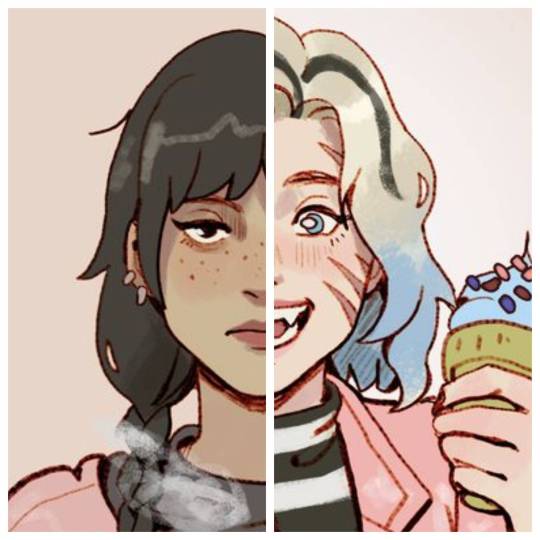
(Artwork from Kris6758 on Twitter)
First, those with some weight in the plot:
Eamon Sinclair (Chapter 1): Initially named in Chapter 1, with no formal appearance until Chapter 43. Eamon is a male counterpart of Enid and husband of Friday (the Wednesday from the 1973 cartoon). Basically, he is "our" Enid if she had been born male. Standard lycanthrope, though exceptionally strong.
Thursday (Chapter 9): Wednesday Thursday Addams. As Eamon, a male counterpart to Wednesday and Friday's cell neighbor. He looks identical to a teenage Gomez but with no mustache and with Fester's pallor.
Enid Saint-Clair (Chapter 19): The Enid of Woe's dimension (the Wednesday of the '90s movies). Brunette, of Greek descent and werecat rather than werewolf. Affable and nice, though with psychopathic tendencies and a love for exacerbated violence. Loves to fight people who can keep up with her. To call her "kitten" is to invite death. Better just call her “Nid”.
Agent A (Chapter 22): Wednesday Tuesday Addams. The Wednesday from a dimension gone to hell (literally). She's a grown woman in her forties, dresses like she's a MIB and is a practitioner of magic. She's also one of the few Wednesdays who doesn't make use of her pigtails or pull her hair back in any way, leaving her hair loose. If you want to put a face on her, I imagine her as Hailee Steinfeld about 16 years from now.
Wodnesdæg (Chapter 35): Lord Wodnesdæg of the House of Adamo, Prince of the Kingdom of Nova Gersia. Wod to his closest family and friends. Trans male version of Wednesday. He collects his hair in two short but thick pigtails. Likes to wear black armor that makes him look like the stereotypical Dark Lord from a fantasy novel, but first impressions aside his personality is closer to that of a Gomez Addams.
Eneit Synklar (Chapter 35): Enid's variant from Wodnesdæg's dimension and his betrothed. A barbarian and werewolf princess Enid, extremely tall and muscular, usually dressed in furs or light leather armor. Very outgoing, affable and friendly, though she lacks a bit of tact and has no qualms about breaking in half anyone who messes with her loved ones.
[UPDATE] The Bright One: SPOILERS! Read the fic 😁
Now, the ones that are more cameos:
Chapter 43:
A golden tyrannosaurus Enid and her ape-like sidekick Wednesday, inspired by the original comic book versions of Devil Dinosaur and Moon Boy.
A middle-aged futuristic soldier Enid.
A Wednesday who looks like a living marble statue with golden cracks adorning her skin and luminous white hair.
A Wednesday and Enid who look like stereotypical pirates.
Gargoyle Enid. A purple-skinned Enid with horns, tail and wings, inspired by the characters from the Disney series Gargoyles.
Chapter 45:
Cyborg-lycanthrope Enid.
Vampire Wednesday, armed with a spear.
Reverse Enid and Wednesday: A violent lycanthropic but black-furred Enid accompanied by a disturbingly extroverted blonde Wednesday.
The younglings: A group of five or six young Wednesdays, the oldest no older than seven.
Saiyan Enid: A brunette-haired martial artist Enid with ki abilities, orange robes, staff and monkey tail. Inspired by Dragon Ball, although it can be interpreted as a reference to Journey to the West as well.
Gunslinger Enid and Wednesday, as if out of a classic Hollywood Western.
Sasquatch Enid.
The witches: Two Enids, one of them in school uniform and wand-wielding, clearly inspired by the Potterverse novels/films or other similar works. The second Enid, with green skin and black clothes, pointy hat and broom is more inspired by The Wizard of Oz and Wicked.
Punk-looking Enid with cybernetic implants like blades in her arms. Inspired by Cyberpunk 2077.
Angelic Enid, alternates between a humanoid form with wings and a fire-wheel form with multiple eyes.
Hellboy Wednesday (Hellgirl?).
[UPDATE] Chapter 50:
A witch-like Enid with a talking cat familiar.
#wednesday addams#enid sinclair#wenclair#wenclair fic#wenclair fanfic#wenid#eniday#the addams family#multiverse#fanfiction#altogether ooky#kooky spooky#multiversal variants#interdimensional counterparts#archive of our own#a03 fic#ao3 link#wednesday netflix#wednesday
84 notes
·
View notes
Note
sorry, i don't know if you've already said this. but i can't find it. what do they look like the ros? height, ethnicities, body type. for all the nitty gritty fanart/-fic/-tasy reasons! ty
The deets will be on the character intro post but I guess I'll go ahead and answer here too. (I suck at descriptions so lts hope 588 words is enough)
Edit: Just added link to the character intro's. Character Intro
Cam- Cam is fair-skinned with warm coppery hair. Length is kept just below the ears. (he's always struggling with the front) He has heterochromia, so his left eye is a warm brown, while his right is a deep green. Cam has a slim athletic build, and he stands at 6'2. He has several piercings in his ears, with a scar on the left lobe from a bad attempt at homemade piercing (thanks mc) Cam has one dimple in his left cheek. He jokes that if he had two he would be unstoppable.
G- G has a warm skin tone. Their hair is a cool black, while their eyes are dark brown almost black. Male G keeps their hair in a two-block style and tends to keep it pushed back (because puppies like to play with hair) while Female G keeps hers mid-length and layered. FG tends to have her hair pulled back. G has a lean build, female and male g are both 5'10''. (and a half, G likes to ensure ppl know that) They are of Korean descent. Their lips are not exactly plump also not exactly thin, a nice in-between. G has a beauty mark under their left eye and another on the right side of their neck. (long gorgeous lashes)
Kara- Her skin is slightly warmer than Cam. She has round strikingly blue eyes, very soft features. Small nose, dainty lips. Her hair hits just above the waist, while the front is layered just above her chest. She keeps in a lighter blonde shade. Kara's has a curvy body type. Her thighs have very much saved some lives. She stands at just 5'4.
M- ( gonna start calling them Mar for short)- Our cinnamon roll is mixed race. Chinese and Caucasian. Their skin tone is naturally warm neutral, though they spend so much time inside they tend to go more pale. Their eyes are slightly downturned and have a nice honey shade. Black messy hair for M and F Mar. While male M's hair is almost to their shoulders female M's hair is just past. They tend to always have dark circles (too much work not enough sleep). W is one of the shorter ros at 5'7. Their build is soft. Ideal for cuddles.
Isaac- Isaac is African American, Slightly upturned blue eyes (Isaac thanks their mom for that). Umber skin-toned. Isaac is built, they like to work out think athletic build. Their hair is curly and a warm black shade, in between lengths it's not short but it's not long sits to the base of their neck. Jawline that could cut glass. Somewhat sharp features. Isaac is an even 6 ft, they're more broad than tall. Isaac has several tattoos on their arm, not full sleeves.
Ardent- Ardent would tell you that his looks are the best things his parents gave him. He's Greek, with olive skin and brown eyes. His hair used to be a nice warm brown now it has a bit of grey on the edges. The length differs, he used to love to let it grow to his shoulders but the cat had other ideas. so now its just a bit short and a bit choppy. It falls to his chin, though he keeps it tucked out of the way. He's our tallest RO a nice 6'4 and broad, so broad, maybe too broad. .Hes tanky. He has scars along his forearms, and one on his lip.
#love and leases#loveandleases#asks#cam#kara#g#m#isaac#ardent#if wip#twine wip#character description
73 notes
·
View notes
Text
“With the consolidation of private property and the father-family, not only the matriarchy but the fratriarchy fell in ruins. The mothers' brothers, abandoning their sisters, became the fathers of their own families and the owners of their own property. This left women with no male allies; they were completely at the mercy of the new social forces unleashed by property-based patriarchal society.
How women felt about this can be gleaned from a passage in the Arabian Kamil, cited by Robertson Smith. He calls it "a very instructive passage as to the position of married women."
"Never let sister praise brother of hers; never let daughter bewail a father's death;
For they have brought her where she is no longer a free woman, and they have banished her to the farthest ends of the earth."
(Kinship and Marriage in Early Arabia, p. 94, emphasis in the original)
In reality women were not banished to the ends of the earth; they were on the contrary cloistered in the private households of their husbands, to serve their needs and bear their legal sons. But to women who were once so free and independent this must indeed have seemed like the end of the world.
With the advent of slavery, which marks the first stage of civilized class society, the degradation of women was completed. Formerly exchanged for cattle, they were now reduced to the chatteldom of domestic servitude and procreative functions. The Roman jurists’ definition of the term "family" is a clear expression of this:
Famulus means a household slave and familia signifies the totality of slaves belonging to one individual. Even in the time of Gaius the familia, id est patrimonium (that is, the inheritance) was bequeathed by will. The expression was invented by the Romans to describe a new social organism, the head of which had under him wife and children and a number of slaves, under Roman paternal power, with power of life and death over them all. (Origin of the Family, Private Property, and the State, p. 68)
The downfall of women brought about a sharp reversal in their "value" as wives. In place of the bride price, the payment made by a husband to secure a wife, we now come upon the dowry. "The Athenians," says Briffault, "offered a dowry as an inducement for men to marry their daughters, and the whole transaction of Greek marriage centered around that dowry" (The Mothers, vol. II, p. 337).
Tylor, one of the few anthropologists to notice this reversal, found it an "interesting problem in the history of law" to account for this curious transposition of bride price into dowry (Anthropology, p. 248). But the law was merely a reflection of the new social reality. Once women lost their place in productive, social, and cultural life, their worth sank along with their former esteem. Where formerly the man paid the price for a valuable wife, now the dependent wife paid the price to secure a husband and provider.
How women felt about this humiliation heaped upon degradation is recorded in Euripides' drama, where Medea mourns:
"Ay, of all living and of all reasoning things
Are women the most miserable race;
Who first must needs buy a husband at great price,
To take him then for owner of our lives."
Even this was not all. After reducing women to economic dependency and to merely procreative functions, the men of early civilized society declared that women were only incidental even in childbearing. No sooner was the paternal line of descent fixed by law than men began to claim that the father alone created the child. According to Briffault, Greek thinkers in the classical period viewed the mother's womb as "but a suitable receptacle"—a bag—for the child; the mother was subsequently its nurse, but "the father was, strictly speaking, the sole progenitor" (The Mothers, vol. I, p. 405). Lippert writes that, while "no historian has turned his attention" to this subject, the evidence shows that matrilineal descent gave way to "the opposite extreme," which he describes this way:
She who for untold thousands of years had been the pillar of the history of young mankind now became a weak vessel devoid of a will of her own. No longer did she manage her husband's household; these services were forgotten in a slave state. She was merely an apparatus, not as yet replaced by another invention, for the propagation of the race, a receptacle for the homunculus. (Evolution of Culture, pp. 355, 358)
This idea that men alone created children indicates that even at this late date, the beginning of civilization, men were still ignorant of the facts about reproduction. Whatever vague speculations they engaged in on the subject, genetic fatherhood had played no part in the victory of the father-family and patriarchal power. Men had won on the basis of their private ownership of property. It was not biology but the Roman law that laid down the dictum patria potestas—"all power to the father." And, as Briffault's description shows, property was the father of this patriarchal legality.
The patriarchal principle, the legal provision by which the man transmits his property to his son, was evidently an innovation of the "patricians," that is, of the partisans of the patriarchal order, the wealthy, the owners of property. They disintegrated the primitive mother-clan by forming patriarchal families, which they "led out of" the clan - "familiam ducere." The patricians set up the paternal rule of descent, and regarded the father, and not the mother, as the basis of kinship -"patres ciere possunt." (The Mothers, vol. I, p. 428)”
-Evelyn Reed, Woman’s Evolution: From Matriarchal Clan to Patriarchal Family
#evelyn reed#patriarchy#women as property#human history#female oppression#male entitlement#history of fathers
74 notes
·
View notes
Text

The holy Church is celebrating with fullness of joy, for Christ “assumed flesh” through His incarnation and rendered the Church “an adornment for the world.” Indeed, the entire human race, and even “all of creation,” rejoices over this divine blessing. “All of creation is today filled with joy because Christ is born of a Virgin.” In contrast to the “unmoved mover” of the ancient Greeks, our God is the communion of love and lovingly moves in time toward humankind and the world. In this is love, not that we loved God but that He loved us (1 John 4:10). The pre-eternal Word of the Father, who granted “being” to humankind, now grants us “well being” through His incarnation. “This is the reason behind the feast; this is why we celebrate today: namely, God’s descent to us so that we might ascend—or return—to God ... in order that, by laying aside the old man, we may assume the new man; and in order that, by dying to Adam, we might therefore live in Christ; in order that we might be with Christ, be crucified with Him, be buried with Him, and arise with Him.” The way of deification through grace is henceforth open to everyone coming into the world. All of us are “capable of containing God.” There is neither Jew nor Greek, neither slave nor free man, neither male nor female; for all of you are one in Christ Jesus (Gal. 3:28).
B A R T H O L O M E W By God’s Mercy Archbishop of Constantinople-New Rome and Ecumenical Patriarch
20 notes
·
View notes
Text
New Muse: Jared Nomak Damaskinos

[Bio and other information below the cut! Trigger warnings ahead for images containing blood and body horror.]
Type of Character & Fandom/Source Material: Canon character from the movie Blade 2. I don't know what's taken me so long to do this, I've wanted to write him for over a decade now, haha.
(Disclaimer: All information here was taken from the Blade II movie, the Blade II Wiki, Villains Wiki, my own headcanons, and other outside research. Some information may conflict with what is in these sources, but my own headcanons have changed some things I felt didn’t make sense or that made more sense to develop in a different way.)
Full Name: Jared Nomak Damaskinos, but he prefers to go by his middle name of Nomak
FC: Luke Goss as Nomak
Gender Identity: Male (he/him)
Romantic Inclination/Sexuality: Hetero-romantic/heterosexual
Species: Natural-born, pureblooded, noble vampire or “Vampyr” of House Damaskinos. Infected later in life with the Reaper Strain virus which genetically altered him to become a Reaper, a species of vampire that is vastly genetically different from traditional ones.
Family: Eli Damaskinos (father); Nyssa Damaskinos (younger sister)
Age: Unknown, but I generally think of him as being 3-4 centuries old, in that range.
Ethnicity: Supposedly Damaskinos was of Greek descent, despite that his entire House speaks a mostly Eastern European-inspired language and that Nomak frequented countries like the Czech Republic and United States. *shrugs* Take from that what you will, heh.
Native language: Ancient Vampiric (a fictional language with Slavic roots and also some Russian and Czech influences)
Abilities/Strengths: High intelligence; superhuman strength; superhuman mobility; superhuman stamina; instantaneous healing; nigh-immortality; escape artist; master martial artist; tactical leadership and stealth skills; enhanced tracking; impersonation; manipulation; persuasion; immunity to garlic extract and silver nitrate; and he is only momentarily weakened by EDTA (ethylenediaminetetraacetic) acid (a chelating agent which alters the clotting ability and overall chemistry of blood and prevents biofilm formation).
Detriments/Weaknesses: Vulnerable to sunlight, although it is not nearly-instantly fatal the way it is for regular vampires. He has maybe a couple minutes of tolerance to it instead of only a couple of seconds. Even if he is burned by sunlight, if he can get back into darkness quickly enough, he will fully heal in seconds. Fire is damaging to him in the same way, but he will also completely heal/regenerate from this if he can extinguish the fire quickly enough. Also, damage to his heart can be fatal if enough is inflicted at one time, but only if the thick bone casing around his heart can be bypassed or crushed.
Potentially Triggering Material in Threads: Blood, gore, violence, viruses, infection, toxins, body horror, genetic experimentation, and medical themes.
Negative Personality Traits: Arrogance, stubbornness, impulsiveness, defensiveness, aggressiveness. Some of this is his core personality while a lot of it is due to changes made to him by the Reaper Strain.
Positive Personality Traits: Loyalty, bravery, intelligence, resilience.
BACKGROUND
Nomak is one of Eli Damaskinos’ sons, making him a pureblooded vampire by birth, as opposed to a vampire that is actually a turned human being. House Damaskinos is something of a royal House among vampire lineages, and because of that, Nomak is referred to by his father as a prince. Damaskinos himself is the head of the worldwide vampire ruling authority known as the Shadow Cabinet. Despite his supposed importance, Nomak was essentially used as a guinea pig for his father’s genetic experiments. He agreed to do it voluntarily, but then after things went horribly awry, Damaskinos abandoned Nomak as something of a dirty secret instead of trying to help cure the viral infection he’d been afflicted with. This left Nomak with a deep-seated resentment toward his family, particularly his father, and a desire to hunt vampires for food.
The goals of Damaskinos’ experiments were to rid his bloodline of the hereditary weaknesses that afflict all vampires, most notably their vulnerability to sunlight. To accomplish this, he funded genetic research involving viral vectors (types of viruses that deliver genetic material to cells) that could be used to cause DNA mutation and fix some of these hereditary detriments. Instead… the Reaper Strain was created, and Nomak was mutated into a new species. What he became was an intense, ravenous, aggressive creature called a Reaper, which is genetically as different from vampires as vampires are from humans. The embarrassment of both the scientific failure and the unhinged creature Nomak had become caused Damaskinos to abandon this way of going about his research, as well as his son. From then on, the research was conducted using cloned embryos that could easily be destroyed if something went genetically awry, since controlling Nomak and containing the infection he bore proved to be impossible.
To kill Nomak, Damaskinos authorized the Bloodpack to hunt him. The Bloodpack were an elite fighting force of vampires headed by his daughter Nyssa who were originally trained to hunt Blade, a half-human, half-vampire vigilante who wanted to eradicate all vampires. Instead, they temporarily teamed up with Blade to eliminate the Reaper spawn Nomak left behind from his feedings and eventually kill him. He proved to be a formidable adversary, however, with both his combat training and the advantages conferred to him by the virus rendering him difficult to pin down or injure. Before Nomak was infected with the Reaper Strain, he had been highly trained as an elite vampire soldier as well, and would have assumed a position much like Nyssa’s at the head of the Bloodpack team in his own geographic region. Hence, he has extensive knowledge and abilities regarding combat, strategy, and stealth.
As a carrier of the Reaper Strain, Nomak retained his personality and intelligence that spawn lack. He was the only Reaper capable of choosing to feed, kill, and/or infect at will, while spawn are at the mercy of their basal instincts. He also was not as dependent on feeding around the clock as spawn were, having the ability to ignore his hunger and postpone feeding for a while if he chooses. That isn’t to say he doesn’t suffer detrimental effects, but he at least has the mental wherewithal to decide to feed rather than being at the mercy of his hunger. However, the hungrier he gets, the more aggressive, antsy, and impatient he gets as well.
His infection left him generally more violent, aggressive, and high-energy because it ramped up his metabolism and hunting instincts considerably. Nomak was not about to be seen as a mindless monster, however, and after giving his signet ring for House Damaskinos to one of Blade’s allies to prove his identity, it became known that he was Damaskinos’ son and that the elder vampire knew far more about the origin of the Reaper Strain than he was letting on. Even Nyssa had been in the dark about the experiments and that Nomak was her brother.
After attempts to make himself seem more sympathetic and to potentially win Blade over to his side were unsuccessful, Nomak made a last-ditch effort to get revenge on his family by breaking into the compound where Damaskinos and Nyssa lived. After killing his father and infecting his sister, Nomak finally took his own life after Blade managed to stab him in the heart through the opening in the bone casing around it. Nomak chose to drive Blade's sword in deeper rather than pull it out and regenerate. Blade then honored Nyssa’s final wish to die before the Reaper Strain took her over and carried her outside to "see the sun."
BIOLOGY AND CHEMISTRY OF THE REAPER STRAIN AND HOW REAPERS FEED
The tongue is what actually delivers the Reaper virus. The virus is injected through the barbs on either side of the bifurcated masticatory (jaw) muscles, which are overdeveloped in Reapers, allowing for a much stronger bite. The basic structure of their jaws remains the same, but there’s no mandible bone. The hearts of Reapers are encased in bone, with only the left side being vulnerable. Thus, stakes through the heart will only work if that sweet spot where there is no bone can be aimed for. If the brain dies, the body still tries to feed.
Spawn need fresh blood every couple of hours or they start feeding on themselves out of desperation. They could literally starve to death in less than a day. Nomak is different because he’s the carrier. Even so, his metabolism is still much higher than that of a regular vampire. He needs to decently feed at least once every day or his health begins to suffer. The more he feeds, however, the stronger he becomes.
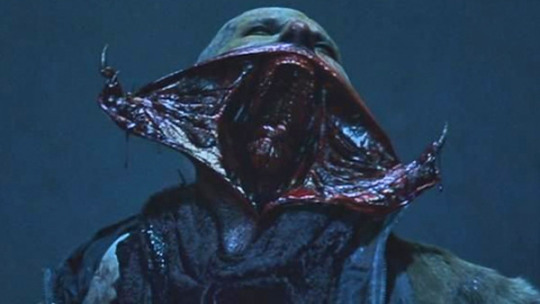
The advantage to infecting while feeding is that they get a better meal for a few reasons. When feeding and infecting, reapers’ jaw bifurcates to reveal two large barbs on the ends of either half that secrete a venom that is a neurotoxin, paralyzing the victim while they feed. This results in the victim’s body and metabolism slipping into a calmer state which allows the reappear to extract more blood more quickly due to lower blood pressure of the victim and a reduction in the constriction of blood vessels. While feeding in this manner, “gills” on the reaper’s back open and delicate, vascular tissue inflates and becomes exposed. This exposure of the vascular tissue to open air increases the oxygen absorption rate into the reaper’s bloodstream, increasing his metabolism further and allowing his body to more efficiently process the blood he is currently ingesting.
This method also renders the victim unable to fight back, allowing the reaper to feed calmly and thoroughly, and there is a school of thought surrounding the diminished mental capacity of spawn that says their animalistic qualities are the result of them being brought to the brink of death as the reaper feeds and their brains being denied oxygen while they lay in a paralyzed state. This leaves the resulting spawn Reaper with only limited intelligence and some memory recall, much like a zombie. However, this effect is still seen in those who have not been paralyzed while infected, suggesting that the Reaper Strain itself causes the diminished and limited mental capacity in spawn. (For example, Lighthammer still knowing and saying Verlaine’s name shortly after he turns, but he still attacks her despite that she’s someone he loves. He had enough memory recall and intelligence to vaguely know who she was, but not enough for emotion or rational thought to prevent him from attacking her.) Thus, it is reasonable to say that the personalities of Reaper spawn are largely lost after turning, and hunting instincts take over.
QUOTE ANALYSIS (Because it sheds some light on his psychology.)

To Blade: “Is the enemy of my enemy my friend… or my enemy?” Nomak was willing to work with Blade to eradicate vampires, which just illustrates how angry he was at his own kind for doing this to him. However, he isn’t sure if Blade is willing to do the same, despite them both wanting the same thing. The rejection by Blade stings Nomak, since it essentially says Blade thinks he’s even lower than the vampires. It also illustrates just how alone Nomak is that he cannot acquire allies who are sympathetic to his cause.

To Damaskinos: “I’ve spared you my fate. You will die.” The fact that Nomak mentions sparing his father his own fate really illustrates how bad he thinks his fate really was. Despite that it seemed like Nomak was on a power trip and enjoying himself while killing vampires and wreaking havoc on human and vampire society alike, the truth as he reveals it here is that it sucks to be a Reaper, no pun intended. It’s hard. It’s painful. It’s relentless. The constant hunger and frenetic nature of having a ramped-up metabolism and heightened aggression had taken a toll on him. It was a fate he would not even wish on the father who had cursed him with it in the first place. Interesting, then, that he did choose to inflict this fate on Nyssa… but I’ll address this point with the next quote.
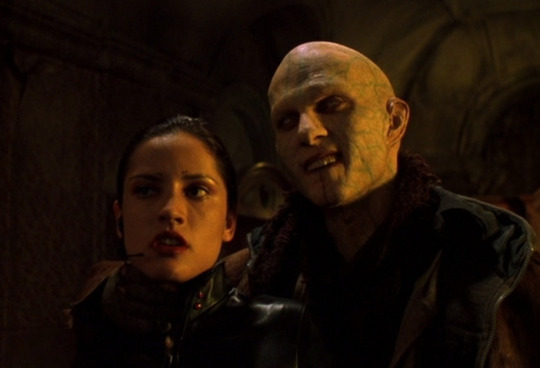
To Nyssa, before he infects her: “You… You were his favorite.” Nomak was really hurt by how easily his father discarded him once his infection didn’t go according to plan. He thought he meant more to his father than that, and to be tossed aside like trash and then hunted like an animal was something that really emotionally damaged him. I think he resented Nyssa for being the “favorite,” or at least what he perceived as the favorite, but as we know from an earlier scene with Damaskinos, he was willing to let Nyssa be killed in order to stop Nomak. This is rather shocking, because not only was he willing to experiment on his own children, but the cleaning up of the embarrassment that Nomak became was of greater importance to him than his daughter’s life. I think if Nomak had known that, he would not have hated Nyssa so much, because essentially, she meant no more to Damaskinos than Nomak did himself. Instead, he resented her for the way she had more value in Damaskinos’ eyes (as far as he knew), and therefore wanted to punish her for that by cursing her with the Reaper infection. Hence Nyssa’s comment to Blade when she asks to “see the sun,” that “I want to die while I am still a vampire.”
It also begs the question, since Nyssa didn’t seem to know Nomak, didn’t know he was her brother, and didn’t know he had been infected with the virus as an adult vampire (as opposed to creating genetically-modified vampire embryos as Damaskinos decided to do going forward)… why haven’t Nomak and Nyssa met before now? Is it possible that Nyssa is a whole lot younger than Nomak is? Or maybe they have simply lived in different countries for most of Nyssa’s life? If Nyssa was living in the United States and Nomak was in the Czech Republic, as he starts out in the beginning of the movie, that would make some sense. Damaskinos was reported to have fathered thousands of children across many centuries, so it's not as far-fetched as one might think that Nomak and Nyssa had never met before.
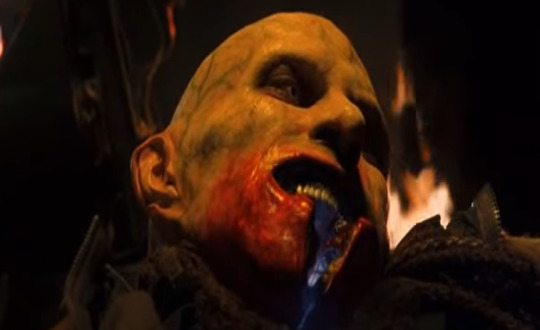
To Blade, while dying: “It’s… strange. It hurts… it hurts no more.” With his healing abilities, Nomak could have removed the blade from his heart, regenerated almost instantly, and been fine. Instead, he forces the blade in deeper, fatally damaging his vulnerable heart after saying the above line. I find this to be the saddest and most poignant moment for Nomak, because no matter how you interpret the line, the upshot is that he was a tortured person… and now he sees a way out of that pain. Either what “hurts” is his rage at his family and his desire for revenge over the wrongs done to him, and it doesn’t matter anymore because he accomplished that revenge, so… why go on fighting? Or, what “hurts” could be the emotional and physical toll the Reaper virus has had on him, on his identity as a person and a pureblooded, natural-born vampire, and how the incessant hunger must have tortured him, and if he just pushes the blade in deeper… it could all end right now. Basically, he’s saying you know what? I’m at peace now. It’s strange, but what had been hurting me isn’t hurting anymore. He’s let go of the rage, the frenzy, and now he just wants to rest. That’s how I interpret it, and it’s sad but it’s also a rather peaceful end to a life that had been thrust into this extremely violent and turbulent existence by his father.
Potential Starter Ideas:
I can easily divorce Nomak from the movie plot and make him a bit more versatile, and will likely do that unless someone specifically wants a thread that follows the plot of the movie.
Maybe he doesn't have an interest in getting revenge on his family. Maybe he just wants to try and lay low somewhere, which backfires when he ends up leaving spawn behind as he figures out how to deal with his infection.
If you have a vampire muse, maybe Nomak wanders into their territory and there's a bit of a turf issue?
If you have a scientist muse or someone who could conceivably develop a cure for the Reaper Strain, he might possibly be convinced to work with you because he really would like to go back to being a normal vampire, heh.
I'm open to whatever ideas you may have! =)
8 notes
·
View notes
Text
Legendary Warrior Women of the Ancient World
Once upon a time, there were women who challenged the might of empires and the laws of men.
They beckoned a world where the whisper of a woman's voice could quake the thrones of tyrants.
Let's delve into these legends from antiquity. 🧵⤵️
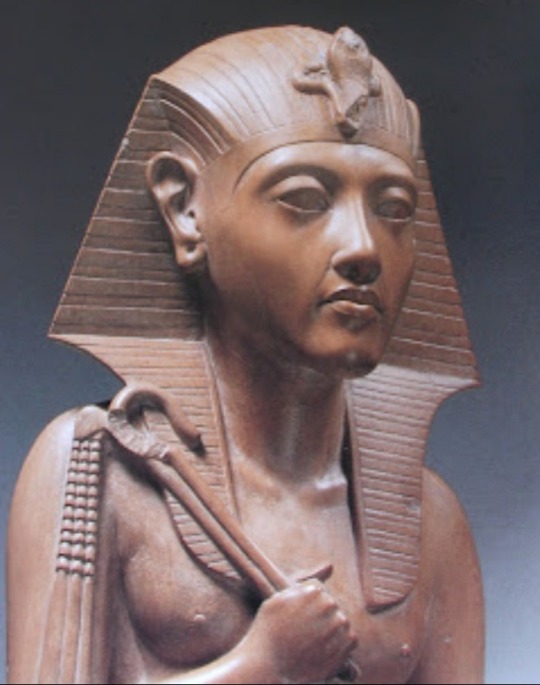
Hatshepsut
The fifth pharaoh of the Eighteenth Dynasty of Egypt, Hatshepsut reigned longer than any other woman of an indigenous Egyptian dynasty.
She was one of the most prolific builders in Ancient Egypt.
To legitimize her reign, Hatshepsut claimed she was divinely conceived by the god Amun, who appeared to her mother in the guise of the pharaoh Thutmose I, her father.
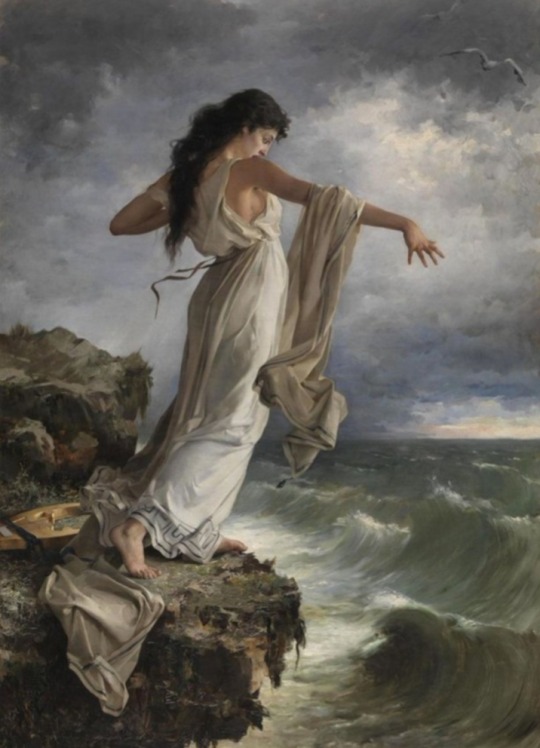
Sappho
An ancient Greek poet from the island of Lesbos, Sappho is celebrated for her lyric poetry, which explores love and passion.
Legend says that Sappho leaped from the Leucadian cliffs due to her unrequited love for Phaon, a ferryman, demonstrating the depth of her emotional expressions that permeated her work.

Artemisia I of Caria
A queen of the ancient Greek city-state of Caria and an ally of Xerxes I during the Second Persian invasion of Greece.
In the Battle of Salamis, Artemisia was so cunning in combat that she intentionally rammed her ally's ship to escape the Greeks, convincing them she was an ally and thus avoiding capture.
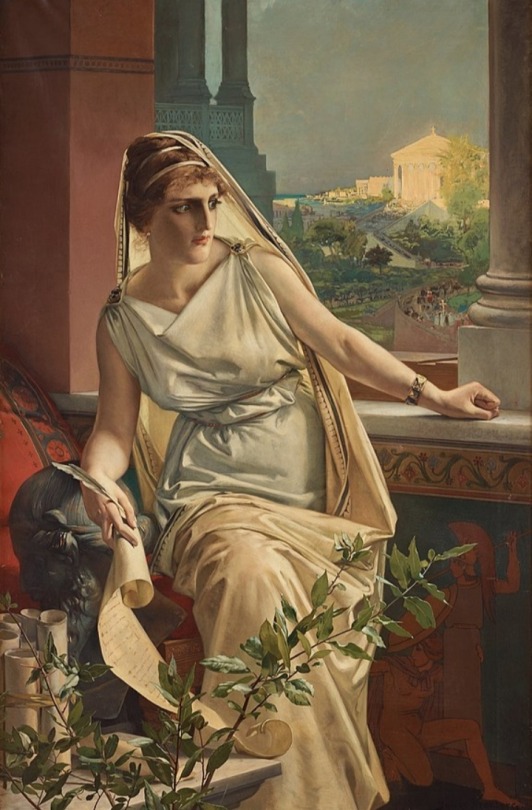
Hypatia
A mathematician, astronomer and philosopher in Alexandria, Egypt, Hypatia was a renowned teacher and thinker.
Hypatia was known to drive through Alexandria in her chariot to deliver public lectures on philosophy, defying the gender expectations of her time.
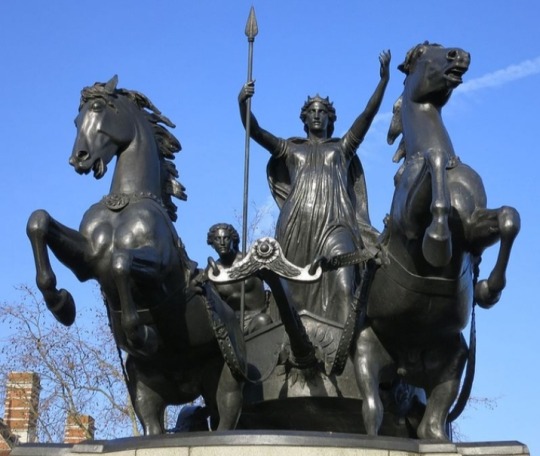
Boudicca
The warrior queen of the Iceni tribe who led a major uprising against the occupying forces of the Roman Empire in Britain.
After the Romans flogged Boudicca and raped her daughters, she rallied her tribe and neighboring tribes for revenge, resulting in the destruction of Roman settlements and the decimation of the Roman Ninth Legion.
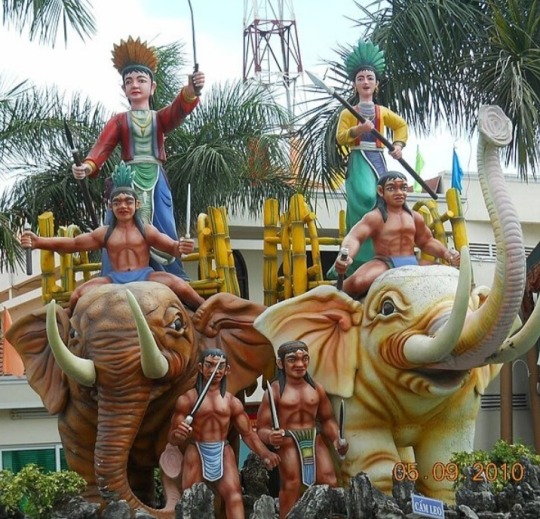
The Trung Sisters: Trung Trac and Trung Nhi
Vietnamese military leaders who rebelled against Chinese Han dynasty rule, becoming enduring symbols of resistance.
The sisters, after witnessing the suffering of their people under Chinese rule, famously declared their independence by proclaiming:
"All the male heroes bowed their heads in submission; only the two sisters proudly stood up to avenge the country."
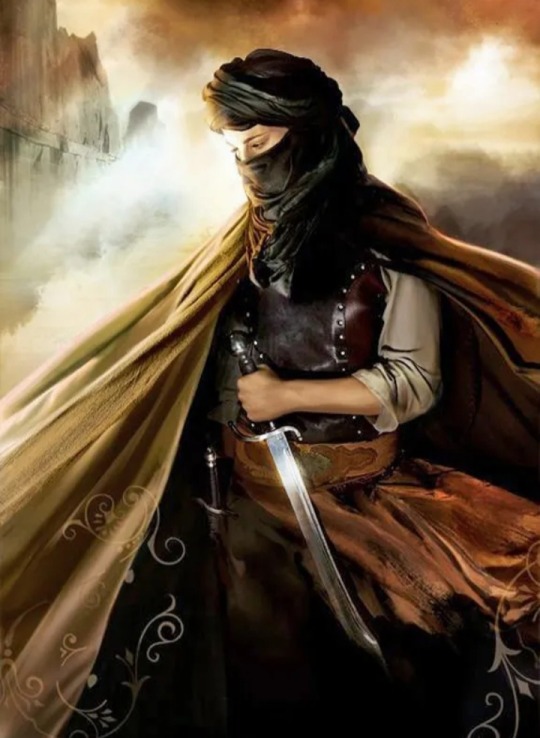
Khawlah bint al-Azwar
A legendary female Muslim warrior, she fought alongside the early Muslims in the battles against the Byzantine Empire.
Khawlah famously donned male warrior’s armor to rescue her brother from a Byzantine prison camp, charging into battle with such ferocity that opponents assumed she was a supernatural entity.
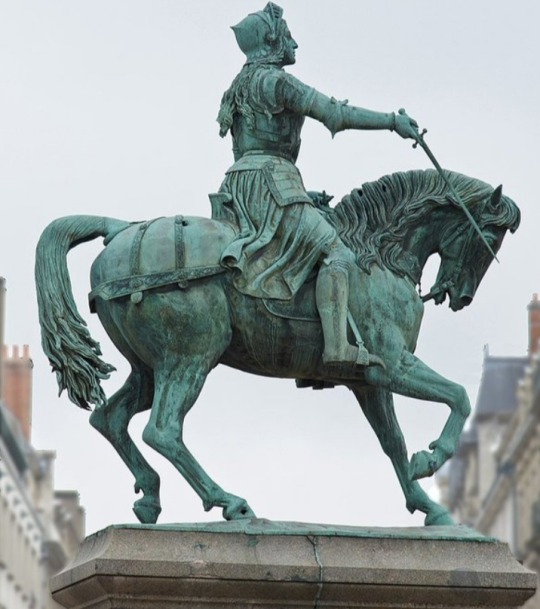
Joan of Arc
A French heroine and saint of the Catholic Church, Joan led French forces to victory over the English at Orléans.
Joan persuaded a skeptical Charles VII of France of her divine mission to save France by correctly predicting a military reversal at the Siege of Orleans, before any messenger could have reached them with the news.

Zenobia
The third-century queen of the Palmyrene Empire in Syria who challenged the authority of the Roman Empire.
Zenobia was so bold that she claimed descent from Cleopatra, positioning herself as the Egyptian queen's successor in defiance of Rome and marched her armies as far as Egypt and Anatolia.
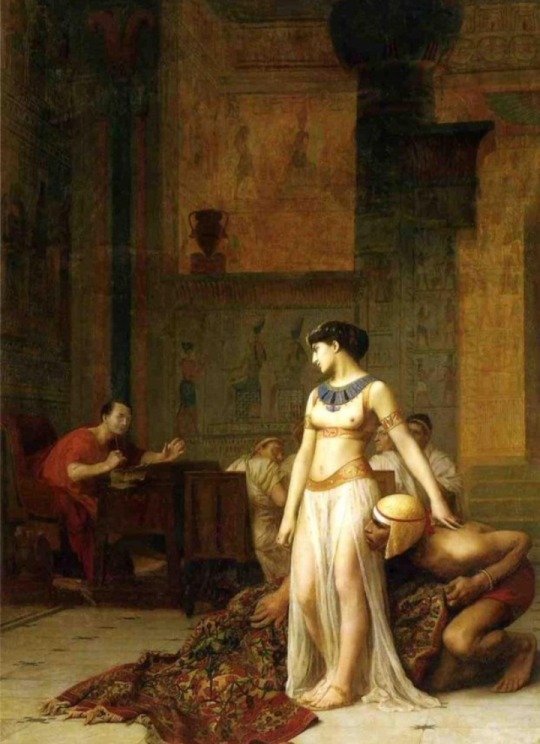
Cleopatra VII
The last active ruler of the Ptolemaic Kingdom of Egypt, Cleopatra is known for her intelligence, political acumen, and dramatic love affairs.
In a famous encounter to secure her alliance with Julius Caesar, Cleopatra had herself wrapped in a carpet (or linen sack, according to some accounts) and delivered to him, emerging to charm Caesar with her wit and beauty.
#female warriors#ancient civilizations#legendary warriors#Hatshepsut#Amun#Thutmose I#Sappho#Phaon#Artemisia I of Caria#Xerxes I#Hypatia#Boudicca#The Trung Sisters: Trung Trac and Trung Nhi#Khawlah bint al-Azwar#Joan of Arc#Charles VII of France#Zenobia#Cleopatra VII#Julius Caesar#ancient empires#ancient world#legends
14 notes
·
View notes
Note
HIIII!!! (omg im so excited that I can finally ask you something) i just want to say first off- I LOVE THE SERIES AND CANT WAIT FOR MORE!! now that my fangirling is out the way (LOL) i just wanted to ask- do VBTS and/or the Lite gang have any specific gender/sexuality identities or nationalities? Love ya!
HII AND THANK YOU SM ❤️❤️❤️ and yes they do :)
lylo is canonically asexual! lylo is of greek descent! and that his name is short for his actual name: lysandros! (seraph nicknamed him lylo and it stuck when they were kids :>) he is male and uses he/him pronouns.
seraph is canonically bisexual and she is of european descent and jewish! she is female and uses she/her pronouns.
sam is also canonically bisexual! he is of hispanic descent (spain specifically!) he's male and uses he/him pronouns.
ironically, the whole trio is all apart of the lgbtq+ LMAOOO
2 notes
·
View notes
Note
Hi! I was wondering if you could tell us about naming conventions when it comes to surnames in Greece? Are there certain type of names associated with a particular place or region? What are the meanings of some of the most common surnames? :)
Hello, yes, Greek surnames are a mix of conventions and messiness! There are too many things that could be said but a summary could be:
Greek surnames are gendered, which means that they have different endings depending on whether the bearer is a man or a woman. This is something that is not acknowledged to Greeks who live abroad where the family name remains unchanged. Take the Greek American actress Nia Vardalos for example. In truth, her father and / or brothers are Vardalos. She is actually Vardalou or she would be, if she lived in Greece. But most foreign states don't acknowledge such in-family name changes.
Greek surname endings typically follow the grammatical endings of standard nouns. The ending also depends on whether the surname follows the nominative or genitive grammatical case (as some surnames indicate a quality - nominative - whereas others indicate ancestry - genitive).
In Ancient Greece, there were no real surnames. The first name was followed by the father's name. The first surnames that could indicate a characteristic or a quality start appearing in Byzantine times. This was continued through Ottoman era. Nowadays, Greek surnames combine all this and can indicate origin from a certain ancestor, usually male but rarely also female, nickname, profession, quality, origin from a region, some personality trait, an appearance trait and anything else you can imagine. It's not unusual AT ALL for surnames to be humorous, ironic or downright offensive and families just learned to live with them!
Some endings are more common in certain areas than others. For example, a masculine surname ending in -akis is from Crete island. -idis or -adis appears in Pontic Greek surnames. -udis or -udas are from Macedonia and Thrace. -akos is from Mani. -atos is from Cephalonia island. -elis is from Limnos and Lesvos islands and the coastal areas of Asia Minor. -usis is from Chios island. The very famous -poulos is more often from the Peloponnese. More on this one later. Some Greeks have a surname ending in -oglu. This is a turkish ending, meaning "child-of". It indicates these Greeks had ancestors who came from Turkey during the population exchange in 1922.
There are also some endings that themselves indicate that the meaning of the surname is that of regional origin. Such common endings are: -ótis, -iótis, -ítis, -ianos, -inós, -éos. A villain in a famous Greek series was called Ares Patrinós. His surname meant some ancestor of his was from the city of Patras.
Some surnames have roots that appear to not have an obvious meaning. This is a consequence of the multi-ethnic and especially multi-lingual character of the Ottoman empire. Greek surnames that have roots that are not etymologically Greek might have especially Turkish or Latin but also Vlach, Arvanite, Slavic, Armenian or Jewish etymology instead. This could indicate that the ancestor had mixed ethnicity / descent or that this ancestor was active in some field or social group where that language was prominent in the empire as there were such lingual functional and class distinctions. There are also surprising etymologies that are of Medieval / Byzantine Greek origin, which have fallen out of regular use as standard words and therefore the surname's meaning isn't clear instantly. All surnames though, even those with non-Greek etymologies are Greek-fied which means that they get the Greek grammar endings and are inflected according to the Greek grammar. The only exception is the surnames ending in -oglu, which is probably because they end in an -ou- sound just like many grammatically Greek surnames, so there was no need to be modified too much.
The most common Greek surname ending you will ever hear is -poulos for men and -poulou for women. -poulos indicate being somebody's child. I.e a famous retired officer we have is called Katerinopoulos, which means "Katerina's child". So here we also see the relatively unusual "origin from a female ancestor" indication. I don't know if he has a daughter or a sister, but if so, they are called Katerinopoulou. Please note that even though the surname means "a woman's child" it is not only bore by the true child of that woman. The surname continued beyond the child and was bore intact by the child's descendants as well. So they are all Katerina's descedants, even if they are not direct children. A cute thing to add is that -poulos does not exactly mean a human child! It literally refers to a hatchling, a baby bird. So, if we are really precise about it, Katerina gave birth to a boy that became known around town as "Katerina's little bird". And then the nickname stuck and became his surname. And pouli means bird in general. It derives from the Ancient Greek πωλος (polos) through the Koine Greek πουλλος (poullos) and has a common PIE root with the Latin pullus. They all mean that; small young animal, usually bird!
The most common surname root you will ever hear has any of these in: papa-, pappa-, papado- . These can be both in the beginning of the surname (i.e Papandreou) or the end (i.e Protopappa). Papa- and all its forms indicate descent from an ancestor who was a priest (as Orthodox priests get married and typically produce A LOT of offspring). So, for example, Papandreou, which is also the surname of a very prominent political family in Greece, means "of Father Andreas". They clearly had an ancestor in the family who was a priest named Andreas (παπά-Ανδρέας / Papa-Andreas). The -ou ending is the genitive case showing origin, possession. When the surname is in the genitive case, it usually doesn't change between men and women as there is no gender changes in saying "of Father Andreas". So both men and women in this family are called Papandreou.
Given all this information, can you tell which is the ultimate most common surname in Greek? Well, of course it's ΠΑΠΑΔΟΠΟΥΛΟΣ (Papadopoulos, or Papadopoulou for women). Which means the "priest's wife's child little bird¨!!! There you go!!!!
Now have a caprice!

#greece#greek#greek language#languages#history#langblr#language stuff#linguistics#greek facts#anon#ask
117 notes
·
View notes
Note
Kind of related to the ask on Cleopatra, and even your one way earlier on Krateros… What do you think Alexander would’ve been like if he weren’t an Argead, and instead fated to be a Marshal for whoever else was meant for the throne? Do you think he would’ve been rebellious? Or cutthroat and ambitious like Krateros? Or more-so disciplined and loyal? I kind of see him as a combination of all three because I don’t peg Alexander for someone who can be contained, lol.
To answer this, we must keep in mind that, for the ancient Greeks, belief in divine parentage for certain family lines was very real. A given family and/or person ruled due to their descent. The heroes in Homer had divine parents/grandparents/great-grandparents. This notion continued into the Archaic period with oligarchic city-states ruled by hoi aristoi: “the best men.” (Yes, our word “aristocrat” comes from that.) Many of these wealthy families claimed divine ancestry; that’s why they were “best.”
In the south, this began to break down from the 5th century into the 4th. But not in Macedonia, Thessaly, or Epiros. In fact, even by Alexander’s day, many Greek poleis remained oligarchies, not democracies. And in democracies, “equality” was reserved for a select group: adult free male citizens. Competition (agonía) was how to prove personal excellence (aretȇ), and thereby gain fame (timȇ) and glory (kléos). All this was still regarded as the favor of the gods.
Alexander believed himself destined for great things because he was raised to believe that, as a result of his birth. Pop history sometimes presents only Olympias as encouraging his “special” status. But Philip also inculcated in Alexander a belief he was unique. He (and Olympias) got Alexander an Epirote prince as a lesson-master, then Aristotle as a personal tutor. Philip made Alexander regent at 16 and general at 18. That’s serious “fast track.” Alexander didn’t earn these promotions in the usual way; he was literally born to them.
If Alexander hadn’t been an Argead, that would have impacted his sense of his place in the world no less than it did because he was an Argead. What he might have reasonably expected his life path to take would have depended heavily on what strata of society he was born into.
Were he a commoner, in the Macedonian military system, his ambitions might have peaked at decadarch/dekadarchos (leader of a file). Higher officer positions were reserved for aristocrats through Philip’s reign. With Alexander himself, after Gaugamela, things started to change for the infantry, at least below the highest levels (but not in the cavalry, as owning a horse itself was an elite marker). Under Philip, skilled infantry might be tagged for the Pezhetairoi (who became the Hypaspists under ATG). But Alexander himself wouldn’t have qualified because those slots weren’t just for the best infantrymen, but the LARGEST ones. (In infantry combat, being large in frame was a distinct advantage.) So as a commoner, Alexander’s options would have been severely limited.
Things would have got more interesting if he’d been born into the ranks of the Hetairoi families, especially if from the Upper Macedonian cantons.
Lower cantons were Macedonian way back. If born into those, he (and his parents) would have been jockeying for a position as syntrophos (companion) of a prince. Then, he’d try to impress that prince and gain a position as close to him as possible, which could result in becoming a taxiarch/taxiarchos or ilarch/ilarchos in the infantry or cavalry. But he’d better pick the RIGHT prince, as if his wound up failing to secure the kingship, he might die, or at least fall under heavy suspicion that could permanently curtain real advancement.
That was the usual expectation for Lower Macedonian elites. Place as a Hetairos of the king and, if proven worthy in combat, relatively high military command. Yes, like Krateros. But hot-headedness could curtail advancement, as apparently happened to Meleagros, who started out well but never advanced far. The higher one rose, the more one became a potential target: witness Philotas, and later Perdikkas. In contrast, Hephaistion was Teflon (until his death). Yet Hephaistion’s status rested entirely on his importance to Alexander. And he probably wasn’t Macedonian anyway; nor was Perdikkas from Lower Macedonia, for that matter.
The northern cantons were semi-independent to fully autonomous earlier in Macedonian history. Their rulers also wore the title “basileus” (king); we just tend to translate it as “prince” to acknowledge they became subservient to Pella/Aigai. Philip incorporated them early in his reign, and I think there’s a tendency to overlook lingering resentment (and rebellion) even in Philip’s latter years. Philip’s mother was from Lynkestis, and his first wife (Phila) from Elimeia. Those marriages (his father’s and his) were political, not love matches.
Similarly, Oretis was independent, and originally more connected to Epiros. Note that Perdikkas, son of Orontes, was commanding entire battalions when he, too, was comparatively young. Like Alexander, he was “born” to it. Carol King has a very interesting chapter on him in the upcoming collection I’m editing, one that makes several excellent points about how later Successors really did a number on Perdikkas’s reputation (and not just Ptolemy).
If Alexander had been born into one of these royal families from the upper cantons, quasi-rebellious attitudes might be more likely. Much would depend on how he wanted to position himself. Harpalos, Perdikkas, Leonnatos, Ptolemy…all were from upper or at least middle cantons. They faired well. For that matter, Parmenion himself may have been from an upper canton and decided to throw in his hat with Philip.
By Philip’s day, trying to be independent of Pella was not a wise political choice, but if one came from a royal family previously independent, we can see why that might be seductive. Lower Macedonia had always been the larger/stronger kingdom. But prior to Philip, Lynkestis and Elimeia both had histories of conflict with Macedonia, and of supporting alternate claimants for the Macedonian throne. At one point in (I think?) the Peloponnesian War, Elimeia was singled out as having the best cavalry in the north. Aiani, the main capital, had long ties WEST to Corinthian trade (and Epirote ports). It was a powerful kingdom in the Archaic/early Classical era, after which, it faded.
So, these places had proud histories. If Alexander had been born in Aiani, would he have been willing to submit to Philip’s heir? Maybe not. But realistically, could he have resisted? That’s more dubious. By then, Elimeia just didn’t have the resources in men and finances.
I hope this gives some insight into how much one’s social rank influenced how one learned to think about one’s self. Also, it gives some insight into political factions in Macedonia itself. As noted, I believe we fail to recognize just how much influence Philip had in uniting Lower and Upper Macedonia. Nor how resentment may have lingered for decades. I play with this in Dancing with the Lion: Rise, as I do think it had an impact on Philip’s assassination.
(Spoiler!)
Philips discussion with his son in the Rise, and his “counter-plot” (that goes awry) may be my own invention, but it’s based in what I believe were very real lingering resentments, 20+ years into Philip’s rule.
#asks#Alexander the Great#Alexander alternate history#ancient Macedonia#ancient Macedonian politics#Upper Macedonia#Lower Macedonia#Macedonian internal politics#Philip II of Macedon#ancient history#Classics
7 notes
·
View notes
Note
Hello!! I hope you're having a great weekend :) I was wondering if I could ask for some suggestions for a 35-50 y/o male faceclaim who's possibly got a gritty vigilante vibe going on - ethnicity doesn't matter, but preferably someone with Jewish ancestry. Thank you a bunch and take care!!
Gabriel Macht (1972) Ashkenazi Jewish.
Sasha Roiz (1973) Ashkenazi Jewish.
Joaquin Phoenix (1974) Ashkenazi Jewish / English, with some Scottish, Scots-Irish/Northern Irish, German, Irish, Welsh, and French Huguenot.
Josh Radnor (1974) Ashkenazi Jewish, as well as approximately 1/8th Irish, 1/8th possibly English.
Taika Waititi (1975) Māori, as well as distant British Isles, possibly French-Canadian / Irish, English, Scottish, Northern Irish, one quarter Ashkenazi Jewish.
Cole Hauser (1975) Ashkenazi Jewish / German, Irish, Walloon Belgian, French, Scottish.
Brett Goldstein (1980) Ashkenazi Jewish.
Morgan Spector (1980) Ashkenazi Jewish / Irish, possibly other..
Daveed Diggs (1982) Ashkenazi Jewish / African-American.
Ari Millen (1982) Ashkenazi Jewish.
Ed Skrein (1983) Ashkenazi Jewish / possibly English.
Wison Bethel (1984) Ashkenazi Jewish, English, possibly Welsh.
Aditya Roy Kapur (1985) Indian / Indian Jewish.
Hale Appleman (1986) Ashkenazi Jewish / Irish, English - is queer.
Oliver Jackson-Cohen (1986) Egyptian Jewish / English.
Zac Efron (1987) Ashkenazi Jewish (paternal grandfather), as well as English, German, Scottish, possibly Irish, and remote Dutch and Belgian/Flemish - in Firestarter!
and:
Don Lee (1971) Korean.
Richard Armitage (1971)
Daniel Sunjata (1971) African-American, Irish, German.
Khary Payton (1972) African-American.
Karl Urban (1972)
Idris Elba (1972) Sierra Leonean / Ghanaian.
Andrew Lincoln (1973)
Scott Adkins (1976)
Lateef Crowder (1977) Afro Brazilian.
Pablo Schreiber (1978)
Nonso Anozie (1978) Igbo Nigerian.
Omar Sy (1978) Mauritanian / Fula Senegalese.
Tom Ellis (1978)
Ian Anthony Dale (1978) Japanese, one-eighth Portuguese-Macanese / English, German, French-Canadian.
Santiago Cabrera (1978) Chilean [Spanish, Basque, French and Belgian/Flemish, English, Irish, German, possibly other].
John Krasinski (1979)
Vinny Chhibber (1980) Indian.
David Giuntoli (1980)
JD Pardo (1980) Argentinian / Salvadorian.
Ricky Whittle (1981) Afro-Jamaican / English.
Rami Malek (1981) 87.5% Egyptian 12.5% Greek.
Tahar Rahim (1981) Algerian.
Colin O'Donoghue (1981)
Joe Taslim (1981) Chinese Indonesian.
Ben Barnes (1981)
Tenoch Huerta (1981) Mexican of Nahua, Purepecha, and Spanish descent.
Adan Canto (1981) Mexican.
Gabriel Luna (1982) Mexican and Lipan,
Iko Uwais (1983) Betawi.
Michael Malarkey (1983) Palestinian, Italian-Maltese / Irish, German.
Aidan Turner (1983)
Marwan Kenzari (1983) Tunisian.
Steven Yeun (1983) Korean.
Sacha Dhawan (1984) Punjabi Indian.
Burak Özçivit (1984) Turkish.
Max Riemelt (1984)
Rômulo Estrela (1984) Brazilian.
John David Washington (1984) African-American.
Clayton Cardenas (1985) Filipino and Mexican.
François Arnaud (1985) - is bisexual.
Adam Demos (1985)
Alex Meraz (1985) Mexican of Purepecha descent.
Miguel Gomez (1985) Colombian.
Martin Sensmeier (1985) Tlingit, Koyukon, Eyak, mixed European.
Peter Gadiot (1986) Mexican / Dutch, some French.
Jai Courtney (1986)
Josh Segarra (1986) Puerto Rican.
Robert Pattinson (1986)
Penn Badgley (1986)
Bobby Soto (1986) Mexican and Puerto Rican.
Yahya Abdul-Mateen II (1986) African-American.
Casey Deidrick (1987)
Arifin Putra (1987) Indonesian, Chinese, and German.
İlhan Şen (1987) Turkish.
Lewis Tan (1987) Chinese Singaporean / Irish, possibly English.
sdfsdf men in this age range with this vibe are @lewistan's and mine's speciality so a big thank you to her and also @antlerqueer for helping!
11 notes
·
View notes
Text

Philippe Bernadotte (OC) // Sixth Year Gryffindor// Overseer of Chaos
French with some Swedish descent (still in contact with his Swede cousins). He’s not entirely sold in the value of an education when his family had always been Hit wizards (and, well, mercenaries, not that it’s something to mention in polite company), and more recently, Aurors. It made his current presence in Hogwarts chafe even more when most of his relatives were back home defending la patrie.
Unlike de Breteuil, his family was never that high in the nobility (they were mercenaries at first, after all) to even hold the whole thing about main branches and cadet branches. So, it didn't even matter to them even if he was the oldest male child of the oldest line. He is generally friends with the rest of the French wizards and witches (he’s a guy who makes friends easily), but his oldest friend is Ceres Victorinus.
'Philippe' is from the Greek name Φιλιππος (Philippos) which means "friend of horses". It's a name that has gotten around through the centuries that most people named Philippe is usually from someone else named Philippe instead of the name being a wish that the child would grow up and be a great cavalry officer/horse rider. Several kings of France have had this name, as well as the kings of Macedon (this includes the father of Alexander the Great)."
---------
Credits to the handsome Swedish model Jack Otterstedt
#fanfic#harry potter#strange attractors#original character#character sheet#tomione fanfiction#slice-of-life#in the times of war#1940s#mine#harry potter aesthetic#hp aesthetic#harry potter moodboard#hp moodboard#Jack Otterstedt
4 notes
·
View notes
Text
The beginning of the [Homeric] Hymn [to Demeter] reverberates with ritual force and mystery. Each image of beauty and life is also an image of death. The golden wheat Demeter holds is synonymous in Greek with the sickle that harvests it (chrusaoras). The narcissus in its hundred-headedness gleams wet with fertility, yet Hades, who mirrors the narcissus' multiplicity through his name, Polydektes, "receiver of many," is the god of death in the under- world. This narcissus is the seducer of the Kore, and will lead to her death and fertilization through her own plucking of it. It is honored in its holiness by all mortals and immortals. Even the sea, the earth and sky smile in the sweetness of its scent. But the smiling, gaping mouth presages the gaping earth that will swallow the Kore. The word for gape in Greek is chazdo, reminding us of the word chaos, or chaos, from the same root. The narcissus is itself called athurma, which, although adequately translated "toy," or "plaything," also implies an object of magical transformation."
Thus the opening imagery of the poem suggests that all the powers of nature acquiesce in the descent of the Kore as part of a magical and fertile cycle of transformation. The female powers are implicated in this as well. For we learn that this "toy" or athurma itself is given "as a deception" or dolon by none other than Gaia, the Kores grandmother. When we put this together with the description of the Kores face as a "bud about to bloom" (kalukopis) and with the description of her playmates, the daughters of Okeanos, as blossoms; when we learn that the word korai (plural of kore) means the "shoots of plants," there can be little question that the Kore is also identified imagistically with the narcissus. As she reaches out with both hands, "amazed," thambas, a word having connotations of being struck with ritual ecstasy, to take the athurma, one cannot help but wonder if the Kore is not in some sense involved in an act of self-plucking. We can certainly infer that she is caught up in a transformative act of death and rebirth, and that, speaking ritually and metaphorically, she draws to herself her own destiny.
Further ritual implications of the imagery are embedded in the mythemes. For one, the maidens are in a leimon or "meadow." In Greek myth, it is difficult to be in a meadow without encountering doom. Meadows are places where death happens. But the word leimon also means female genitalia. To read through the images then, as the "bloom" is plucked from the "meadow" the virgin is deflowered and the genitalia open to disclose the yawning chasm which is the original place of birth and death, the womb of mother earth from which we all come and to which we all return. And, as we know, although Polydektes may be identified with the narcissus through the equation of multiplicity, in the Hymn, Gaia herself, not the "Receiver of Many." sends the narcissus.
At the same time, the poem tells us that Gaia’s dolon, or "deception," was grown "at the will of Zeus," Dios bouleisi. Is this not a clear mark of patriarchal domination? Yes, on the explicit, narrative level of the text. But implicitly there may well be a linguistic pun here that would resonate in the thematic repertoire of the oral poet, between the words Dios bouleisi and Eubouleus, who turns up in an Orphic version of this myth as the swineherd who falls into the chasm with his pigs together with the Kore.'" Swineherds are intimately related to sows and boars, both of which were sacrificed to Demeter and Persephone. Further, in the Thesmophoria, the other major Demeter festival of the year and an exclusively womens rite honoring fertility, pigs themselves are thrown into the earth at the time of female menses and then dug up again along with snake idols." Again it would seem that the ritual mystery is orchestrated not by males but by females, who understand fully the nature of the cycles of birth, decay and rebirth.
-From "Ritual Death, Patriarchal Violence, and Female Relationships in the Hymns to Demeter and Inanna" by Marcia W. D-S. Dobson
#persephone#demeter#Eleusinian Mysteries#quotes#greek myth#i can't help noticing that the 'toy' or 'plaything' here resembles the toys of dionysus in orphic myth
6 notes
·
View notes